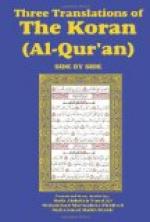6 Lit vizir.
7 Or, strengthen my back.
8 The form of the word in the original is not the pure Hebraic, but the later Rabbinic form.
9 See Sura [lxxix.] xxviii. 11, 12.
10 What is their condition after their death as to happiness or misery. Beidh. whom Sale follows. But the word state, which Mar. renders mens, refers rather to their creed. “How,” enquires Pharaoh, “do you explain the fact that the generations of men have always practised a different worship?”
11 Lit. pairs.
12 The Midrasch Tanchumah on Ex. vii. gives a very similar dialogue between Pharaoh and Moses.
13 Lit. the day of ornament.
14 In punishing. Beidh.
15 To recompense. Beidh.
16 As the garden is said in Sura lxxxviii. to be lofty in point of situation, this frequently recurring phrase may mean that rivers run at its base. The Commentators, however, generally understand it to imply that the rivers flow beneath its shades or pavilions.
17 Lit. and there overwhelmed them of the sea that which overwhelmed them.
18 The 70 elders who were to have accompanied him.
19 That is, the Samaritan. This rendering, which is probably the true explanation of the word Samiri, involves a grievous ignorance of history on the part of Muhammad. Selden (de diis Syr. Syn. i. ch. 4) supposes that Samiri is Aaron himself, the Shomeer, or keeper of Israel during the absence of Moses. Many Arabians identify him with the Micha of Judges xvii. who is said to have assisted in making the calf (Raschi, Sanhedr. 102, 2 Hottinger Hist. Orient. p. 84). Geiger suggests that Samiri may be a corruption of Samael. See next note. But it is probable that the name and its application in the present instance, is to be traced to the old national feud between the Jews and Samaritans. See De Sacy, Chrestom. i. p. 189, who quotes Abu Rihan Muhammad as stating that the Samaritans were called Al-limsahsit, the people who say, “Touch me not” (v. 97, below), and Juynboll Chron. Sam. (Leid. 1848) p. 113. Sale also mentions a similar circumstance of a tribe of Samaritan Jews dwelling on one of the islands in the Red Sea.
20 “The calf came forth (Ex. xxxii. 24) lowing and the Israelites beheld it. R. Jehuda saith, Samuel entered into it and lowed in order to mislead Israel.” Pirke R. Eliezer, § 45.
21 From the track of Gabriel’s horse, or of Gabriel himself.
22 Lit. no touch.
23 I have adopted the word leaden as expressive of the idea implied in the original word, viz. grey or greyish blue; hence, dulled, dimmed. The Arabians have a great aversion to blue and grey eyes as characteristic of their enemies the Greeks. The word, however, may also mean blind. Comp. v. 124, 5.
24 Lit. the most excellent or just of them in his way: dignitate, Mar. But Kam. in Freyt. (iii. 150) justissimus eorum, simillimus veracibus. The sense of the last clause is, “Yes have not tarried even so much as ten days, such, now that we look back upon it, is the brevity of life.” See Sura [lxiv.] xxiii. 115.




